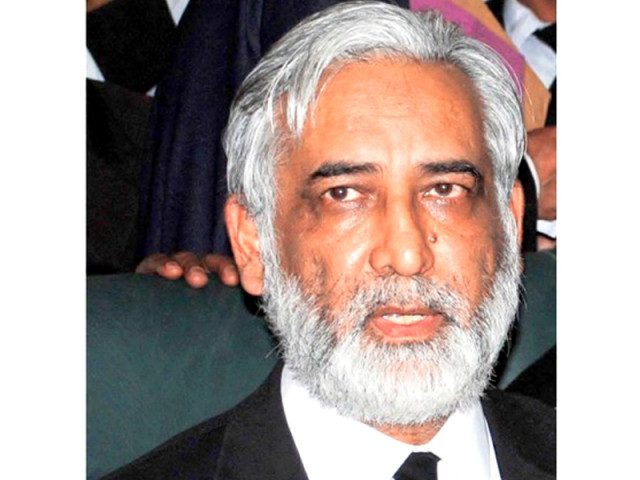Towards ending corruption: ‘Prompt verification of sureties will end several litigation issues’
System introduced in Malir courts for now.

For Justice Alam, there are only good and bad people in this world and the bad ones are those who have adopted the culture of corruption as an occupation. “It is time to look into their eyes and get rid of them.” PHOTO: FILE
The verification section is the first-of-its-kind at the district level across the country to provide speedy justice to the litigants, who otherwise encounter a lengthy process to get clearance of documents submitted in the court. The section will help the courts verify affidavits, documents of vehicles, property papers, CNICs, biometrics and other documents that would be submitted in the courts.
The sessions courts in Malir have been chosen as a ‘model district’ and the system has been introduced here after the Karachi Bar Association (KBA) opposed it. “This system helped the court save Rs1.8 million last year,” pointed out the outgoing chief justice of the Sindh High Court, Justice Mushir Alam, who was the chief guest at the occasion. “If the Karachi Bar Association is not interested then it doesn’t matter. We’ll move to other bar associations.”
Sending a clear message to opponents, Justice Alam said that after eradicating corruption from the SHC, he was eying the subordinate judiciary and the registrar offices, where corruption has dug its claws deep into the system. “We will not shake hands with the people who are not supporting us in our efforts to eradicate corruption,” he said. “Since the day we announced jihad against corruption, a war has been waged against us.”
For Justice Alam, there are only good and bad people in this world and the bad ones are those who have adopted the culture of corruption as an occupation. “It is time to look into their eyes and get rid of them.” He was of the view that corruption is the only hindrance in the way of progress.
Alam said he was aware of the fact that over a 100 courts were laying vacant in the subordinate judiciary in Sindh but he explained that the process of appointing judges was taking time as the judiciary was looking for people with good character instead of just filling the courts. “Courts don’t sell chickpea, they decide about the life and death of people. Only qualified people would be appointed.”
Earlier, the newly elected body of the Malir Bar Association (MBA) swore in during the oath-taking ceremony administered by Justice Alam. The district and sessions judge, Malir, Muhammad Yamin, said that the system would definitely put an end to the fake sureties and cases.
Mustafa Lakhani, the president the Sindh High Court Bar Association, hoped the system would soon be introduced in the city courts. “Automation is the best solution to eradicate corruption,” said the IT department in-charge at the SHC, Arif Khan.
MBA president Muhammad Ashraf Samoo assured that the role of the Malir bar would always be positive. “With the inauguration of this system, the doors to fake guarantors and sureties have been closed forever.” A large number of the SHC and district judges, members of the bar associations and officials of the National Database Registration Authority were present at the oath-taking ceremony and inauguration of the verification section.
What is a surety?
A surety is a guarantee document furnished by a person known to the accused when the latter is released on bail by a court. Ideally, the guarantor should be a close relative of the accused but not necessarily.
The surety is submitted in the form of Defence Saving Certificates, property papers, lease papers and vehicle papers. Once the surety is submitted in court, the documents are sent to a bank, registrar office and the excise taxation office for verification. The departments return the papers with their remarks on whether or not the documents were fake or had already been used by another party before the courts.
With the new verification system, all documents will be verified then and there, which will solve several litigation issues at the grassroots level.
Published in The Express Tribune, September 18th, 2013.



















COMMENTS
Comments are moderated and generally will be posted if they are on-topic and not abusive.
For more information, please see our Comments FAQ